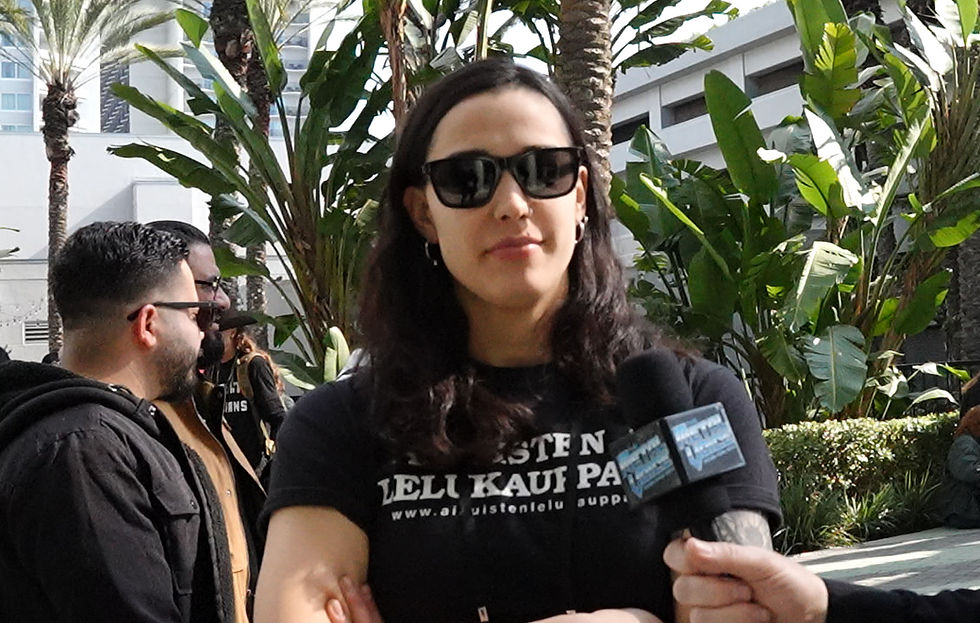Former Ozzy Guitarist Gus G Talks About His First Instrumental Solo Album, w/ Co-Host Todd LaTorre
- The Metal Voice
- Nov 27, 2021
- 4 min read
Updated: Nov 28, 2021

Jimmy Kay along with Queensryche singer Todd LaTorre interviewed former Ozzy guitarist Gus G about his new Instrumental solo album 'Quantum Leap' which was released October 8, 2021 via AFM.
Quantum Leap came together over the course of the worldwide pandemic that, unfortunately, prevented Firewind's self-titled album from 2020 from gaining any real momentum. Immobilized by the quarantine measures that kept him at home, Gus began compiling musical ideas to keep himself occupied, which led to the full-on effort to write and record an album during the summer of 2021
"I didn't make Quantum Leap with the intention of it being the next one in the cycle of solo albums," Gus admits. "It was more of a case of, 'What else is there?' I needed the creative outlet."

Buy album Gus G Quantum leap here
Gus G. made a name for himself with Firewind, the band he initially launched as a solo project in 1998 that made its official debut in 2002. In that time the band has released nine albums, while Gus has also recorded and toured with Mystic Prophecy, Nightrage, Arch Enemy, Dream Evil and Ozzy Osbourne. He has also made inroads as a solo artist, having released three albums under his own name: I Am The Fire (2014), Brand New Revolution (2015), and Fearless (2018). He closes 2021 with a new instrumental solo effort, Quantum Leap, featuring 10 tracks that both showcase the playing style Gus is known for and takes fans into new territory.
Quantum Leap was assembled in pieces, featuring new compositions and material taken from Gus' "riff vault", where he stores unfinished ideas and revisits them when he's able. The album started as a full-on solo outing, with Gus programming drums and playing guitar, bass and keyboards, but a chance encounter with drummer Vincent Velasco - who volunteered his services and subsequently blew Gus away - opened up the production. Producer / engineer Dennis Ward, who was responsible for mixing and mastering Quantum Leap ended up laying down bass tracks on eight of the 10 tracks.
Unlike many instrumental albums, Quantum Leap doesn't feel like a musical root canal or long and drawn- out brain surgery. Each of the 10 tracks are solid and compact musical ideas, with Gus' guitar acting as the voice. In this respect, writing Quantum Leap was a challenge because he is so used to writing in a specific formula utilizing vocals. He found himself falling into the loop of overplaying a few times during the production because of the lack of vocals, but was able to overcome the problem once he acknowledged it.
"When I first wrote 'Exosphere', for example, there were so many things going on in the track but it wasn't saying anything," says Gus. "I really needed to have the guitar taking a vocal approach. I knew that if I just kept the playing technical it wasn't going to be enjoyable. So the playing isn't always about technique, and once I found the formula it was easier to create melodies for the record."
"I'm a guitar player and I cannot stand most instrumental guitar albums," he adds. "The classic are the classics, but very rarely do I get into them because after the third track it just seems like an endless guitar solo where everything that sounds the same. That's something I wanted to avoid on Quantum Leap and I think I succeeded in doing that."
GusG. (Guitars), Dennis Ward (Bass, Vocals), Will Hunt (Drums)
Watch Full interview here
Plus Gus G also shared his thoughts on Ozzy's first four albums.
When asked which of the first Two Ozzy albums (Randy Rhoads era) he prefers
"I cannot really pick which one I like more. The biggest hit of course is on the first album (Blizzard of Ozz) 'Crazy Train' but the second album (Diary of a Madman) is the one that I was exposed to first. From an emotional side, that was the first album I heard from Ozzy. They both have my top spot. What made the Randy Rhoads' albums so special was a combination of things, it was the way he blended a European flavour of playing with a classic American rock style. Randy Rhoads was able to play metal riffs and leads and kind of put them in a sort of pop rock song format for the radio. What Zakk Wylde had said was that Rhoads was like the prototype of the modern metal guitar player and I really agree with that statement. There are just so many things that made Randy Rhoads special."
When asked about his opinion on Ozzy's Bark at the Moon Album
"The title track, it has to be one of my favorite Ozzy songs and when we played live with Ozzy we opened the shows with that and it was fantastic,"
What about The Ultimate Sin?
"I love the song 'Shot in the dark' and there are also a lot of hidden gems on that album too like, 'Lightning Strikes Again', 'Killer of Giants'. I Remember telling Ozzy how I liked the album and he told me how much he hated the album because it was a bad period in his life and he didn't like the mix."









Comments